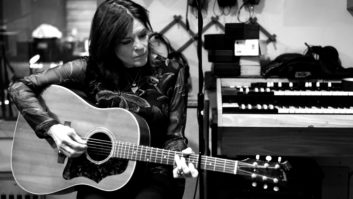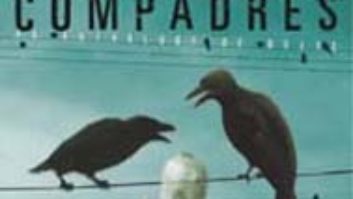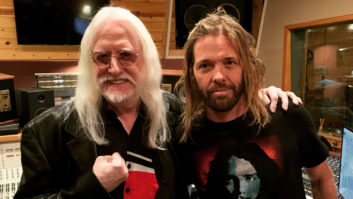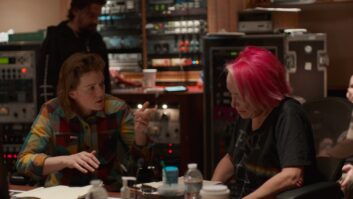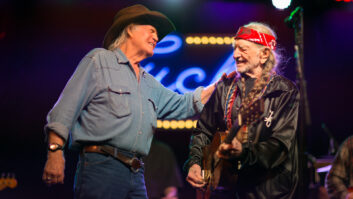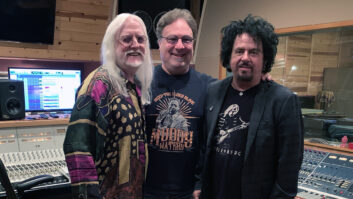Johnny Cash and Marty Stuart go way back. “The first two country records I ever owned were Flatt & Scruggs’ Greatest Hits and The Fabulous Johnny Cash,” Stuart says. “And while everybody else at kindergarten was bringing in their pet ducks or card tricks or baton twirling for show-and-tell, I went as Johnny Cash and played ‘Don’t Take Your Guns to Town.’
“Most people would just get over it,” he continues, “but I had to follow it, pursue it, collect every record, join the band, marry his daughter, get a divorce. Johnny is one of my best friends, and I still champion the cause to this very minute. It was bigger than me. I still love the music the way I did when I was a kid.”
It was Stuart’s deep emotional connection to Cash’s songs, as much as it was his talent as an artist and producer, that made him the perfect choice to assemble Kindred Spirits — a tribute to the Man in Black’s artistry as a composer and a celebration of Cash’s 70th birthday this year. “I don’t remember a record being done before this where he was triumphed as a songwriter,” Stuart says. “A guy whose pen has influenced almost every culture and every genre of music out there.”
To illustrate Cash’s broad sphere of influence, Stuart reached beyond the world of country to include previously recorded tracks by Bob Dylan and Bruce Springsteen, as well as make new recordings with Keb’ Mo’ and Little Richard. The country artists represented are all outside-the-lines types, many of whom deserve their own tribute records: Steve Earle, Emmylou Harris with Mary Chapin Carpenter and Sheryl Crow, Travis Tritt, Hank Williams Jr., Dwight Yoakam, Stuart, Charlie Robison, and two of Cash’s illustrious family members, Janette Carter and Rosanne Cash.
“His songs are about feeling and emotion and story,” Stuart says. “Those kinds of songs and performances are about personalities. The people who showed up to work on this are powerful personalities — every one of them. I think that if anybody in this world would understand taking somebody else’s song and making it their own, Johnny Cash would.”
“FLESH AND BLOOD”
Sessions for Kindred Spirits began in Nashville at Masterlink Studio, with Emmylou Harris, Mary Chapin Carpenter and Sheryl Crow performing the sweet, passionate ballad “Flesh and Blood” — the album’s first track. Stuart notes, “That was one that Emmy and Mary Chapin, Sheryl and myself played at a concert up in New York City, and we resang and replayed it the same way because it felt magical up there.”
To Stuart, the magic of live performance was the key ingredient in this project, and it was the one mandate that he handed to each of the engineers he worked with. All were instructed to capture performances as live as possible to just one 24-track analog machine — no workstations, no digital editing and very few takes.
“That’s one of the things I love about Marty,” says Chad Hailey, who recorded all of the album’s Nashville sessions. “Something he and I had going for our relationship right off the bat is that we both love live, and you can tell that from listening to this project.”
Hailey is a Nashville-born, old-school engineer, though his background also includes work with New England Digital Corp., servicing and installing the manufacturer’s disk recorders, PostPros and Synclaviers. He’s engineered sessions with J.J. Cale, Eric Clapton and others, and now does almost all of his work at Masterlink, which he loves for its vibe and its well-maintained gear. Another estimable old-school trait about Hailey (who provided the track sheet for “Flesh and Blood,” page 50): He keeps impeccable notes and has no trouble recalling the most minute details.
For all of the Nashville sessions, Hailey had the drummer, bass player and electric guitarist(s) on the main room’s floor, using a bit of baffling. Lead vocalists sang in one of the studio’s three iso booths, and all of the lead vocals, with the exception of Travis Tritt singing “I Walk the Line,” were miked with Hailey’s AKG C 12: “Serial number 22, which Bill Bradley at the mic shop keeps tweaked up really well,” Hailey says. Tritt requested a Manley Gold Reference mic that Hailey says was “equally pure and great.”
All of the vocals went through a UREI 1178 compressor/limiter or a dbx 160 compressor/limiter. On drums, Hailey used a pair of Shure SM57s top and bottom through an Avalon AD2022 mic pre, and blended them to one track: “It gives you a little more tonal control over the drum,” he explains. Hailey also blends an AKG D 12 and an Electro-Voice RE-20 on kick drum.
On electric guitars, Hailey typically uses at least three mics, sometimes as many as five: “For the main work, I had a Beyer M 160, a ribbon mic, through a Telefunken V76; an SM57 through a 1073 Neve; and a Sennheiser 421 through a 1073 Neve. All of those are summed down to a mono track. I blend everything on-the-fly going to tape, so you really have to be committed. I’m not one of those people who says, ‘Oh, let’s print all of these different tracks, and then we’ll figure it out later.’ Marty knows that’s not the way I work. I want to hear it really well when we’re doing it, and that adds to the liveness of it. I’m a big believer in mono guitar: big, nice, fat mono guitar tracks.”
The sessions for “Flesh and Blood” were more complex than the other songs’, because Stuart and Hailey wanted all three of the vocalists to be able to sing and play live with the other musicians. “Sheryl was in the main booth that we did all of the other vocals in,” Hailey explains. “Emmylou was in one of the other booths, and she used a [Neumann] U67. [Carpenter’s vocals were recorded by John Jennings in Virginia and overdubbed to a stem mix created by Hailey.] All of the vocals at Masterlink were done through Neve 1081 preamps and EQs. But what made this difficult, and where I think Justin Niebank [mixing engineer] did a really great job, was where Emmy played acoustic guitar and sang at the same time — that’s not an easy thing to capture. But Justin did a great job pulling it all together.” The only other overdubbed part on “Flesh and Blood” was Sheryl Crow’s accordion, which was captured with a U47 through an API mic pre.
Like all of the Nashville sessions, “Flesh and Blood” was recorded to an Otari MTR-100. The performers recorded only three takes on the day after Hailey and some of the artists worked into the wee hours on this year’s CMA Awards. “By the time I got out of the CMA Awards, it was 1 or 1:30 a.m. But at the session the next day, everyone really focused on the track, and I think it worked to everybody’s advantage. On some things, you come in and you’re fully rested and everybody’s very up, and it makes for an edgy kind of thing. The kickoff of this track was just really sweet and lovely. It was a pleasure to do. The take we chose was the first take.”
“GET RHYTHM”
Hailey recorded many of the country artists on the album, including Dwight Yoakam, Hank Williams Jr., Charlie Robison, Steve Earle and Stuart. Two of the most distinctly noncountry sessions, however, took place in Los Angeles at The Village. Keb’ Mo’s Southern blues version of “Folsom Prison Blues” was recorded by Mark Johnson, and Little Richard’s rock ‘n’ roll take on “Get Rhythm” was engineered by Claude Achille, whose diverse decade-and-a-half of experience includes sessions with artists such as James Cleveland, Fiona Apple, Ice Cube and Mariah Carey.
“We just went for it like they did in the old days,” Achille says. “Let’s not worry about pitch correction and making it sound like a perfect record. Let’s get the feel of this, which is what Marty was looking for. Let Richard do his thing, which is always great.”
“Get Rhythm” was captured during one fast six-hour day, with the legendary star determining much of the arrangement’s shape. “As Richard played the piano runs, he would definitely say, ‘I’m going to do that there,’ or ‘Don’t crowd me there,’ but they were great musicians, and they could edit themselves — listen to his playing and his vocal and play around that.”
Achille set up the musicians in the Village’s Neve 8048-equipped A room, with Little Richard on the right side of the main room. To his left and facing him was drummer John Ferraro, who was surrounded by Plexiglas gobos. Electric guitarist Stuart was situated behind Little Richard, and next to him was bassist Jesse Boyce. Guitar, bass and drums were recorded first, with Little Richard doing scratch versions of his piano and vocal parts. The next recorded parts were piano, Jesse Boyce’s double-duty on organ and Plas Johnson’s sax. Then, it was Little Richard’s incendiary vocal — undiminished by time — recorded to a U47 through a UREI 1176, to the Studer A800 out in the middle of the studio. “It was determined that we would only use two tracks to do vocals,” Achille explains. “So we did one, we did another one, and then we went over the first one — only three takes. We didn’t want to overdo it and lose that rawness, that energy.”
Stuart says that when he played the finished album for him, Johnny Cash “was really taken by Little Richard, who is the only person in the lineup who was a contemporary of Johnny Cash. I didn’t know Little Richard [before this project], but I was a fan, and my instinct told me that Little Richard would absolutely get it. I wanted to give him a song that he could absolutely tear alive, and we made some real rock ‘n’ roll that night.”
“I STILL MISS SOMEONE”
Even given the brilliance of the A-list performers on Kindred Spirits, none brought more pure feeling to the album than Cash’s daughter, Rosanne. On “I Still Miss Someone,” she sings with a sweetness and a beauty worthy of one of her father’s most heartfelt creations.
“She’s got such a great voice. She’s so easy to record,” says recording engineer Tom Schick, who manned the sessions at Sear Sound in New York City. He also recorded Rosanne Cash’s most recent album, Country Side.
Schick began his engineering career as a staffer at Sear Sound; now, he’s independent but tries to bring as many of his projects back to Walter Sear’s place. “This is one of the last studios where they do things the old-fashioned way,” Schick maintains. “They have the world’s greatest mic collection and the world’s greatest outboard gear.”
Daughter Cash’s vocal was captured with a Neumann U49, which Schick chose after quickly testing a couple of other models. “We tried the U49, an AKG 251 and a U67 that Walter has that’s serial number 3 or something ridiculous like that, and the 49 ended up winning out, through a Fairchild 660.”
Schick set drummer Shawn Pelton up in a small booth with two Coles ribbon mics overhead, a Shure SM57 on snare and an AKG D 112 on kick. The snare mic went through a U.S. Army compressor: “Just one of those crazy things Walter has,” Schick says.
Acoustic guitar was miked with an AKG C 60 and played by John Leventhal, who also served as arranger. Stuart’s electric guitar amp had a Shure SM57 mic on it. Schick also used a UREI LA-2A on each guitar.
“I just remember it going really fast and really smooth,” Schick says. “Everybody came in, they ran it down a few times and then went with the first or second take. I do remember doing a tape edit on something between two takes; I think maybe using the outro from take 3 and the rest of the song from take 2. But there was no digital editing and not many fixes. It was a performance.”
“I Still Miss Someone” was actually the only track that was embellished with additional recording after the original sessions. Stuart and Hailey added a string section and backing vocals by Vince Gill and Cheryl White, all recorded at Masterlink. But most of the tracks were pared down, if anything, before making it onto the album.
“There were a couple of songs that we stripped the arrangements down just a little bit to make the vocals come forward more,” Niebank says. “But, in general, our job was just to make sure it kicked as hard as possible. On something like the Little Richard track, for example, it was all about getting the vibe, because I was simply blown away by his performance. I just wanted to make sure I stayed out of the way. That’s one of the best recordings of him in 20 or 30 years.”
Niebank comes from a roots-oriented background: He recorded dozens of albums for Alligator Records in Chicago before moving to Nashville eight years ago. He now works with a variety of rock and country artists, including George Strait, Keith Urban, The Iguanas and Stuart. He mixed Kindred Spirits on East Iris’ 9000 J console.
“This is a really wonderful studio in Berry Hill in Nashville,” Niebank says. “It’s got a fantastic collection of outboard gear, and it’s a really nice, vibey one-room studio.
“I didn’t feel like I needed to slam on anything, but we had some fun with some compression, and I probably used a little more spring reverb than I do on other records, because I love that, and we really made sure that our [Studer A800] analog 2-track sounded great.”
The main monitors in East Iris are Tom Hidley models, but Niebank listens on the studio’s Genelec 1031 reference monitors. He says that typically he’d work a while on a track and then ask Stuart to come in and listen. When Stuart was satisfied with the mix of a song, they’d send it off to the artists to make sure that they were satisfied, as well.
Niebank insists that his job was pretty simple, because Stuart and his engineers managed to capture such exceptional performances. “Marty, as a great producer, was able to get everyone to let their hair down,” he says, “so that their true artistry came through. I love the Keb’ Mo’ track. I like the Dwight Yoakam track; I like the naturalness of the guitars. I’ve never been a huge Hank Williams Jr. fan, but I love that track [“Big River”]. It has a natural toughness, and I think the slap bass on it is amazing.
“One of the good things about pushing up this record was that the character of the record absolutely wrapped around me, and it’s a good reminder to people to just put up a few mics, let people rock and see what happens. You don’t have to tweak and program and cut and paste till it’s so perfect that you can’t remember what you started with.”
“The thing that I walked away from this project with is the same thing that inspired me when I was five years old,” says Stuart. “Johnny Cash is a fearless kind of artist, and I walked away from this rededicating myself to being a fearless artist, being true to what God gave me in my heart to play and sing, and I think it makes us more pure artists if we take our cues from masters like John. God gave him a powerful gift. Let it rip. It’s for the rest of the world to enjoy. We can only stand and marvel at it.”
Barbara Schultz is the senior associate editor of Mix.
“KINDRED SPIRITS”
TRACK LIST
Dwight Yoakam: “Understand Your Man”
Rosanne Cash: “I Still Miss Someone”
Bob Dylan: “Train of Love”
Little Richard: “Get Rhythm”
Keb’ Mo’: “Folsom Prison Blues”
Travis Tritt: “I Walk the Line”
Hank Williams Jr.: “Big River”
Bruce Springsteen: “Give My Love to Rose”
Charlie Robison: “Don’t Take Your Guns to Town”
Mary Chapin Carpenter, Sheryl Crow, Emmylou Harris: “Flesh and Blood”
Steve Earle: “Hardin Wouldn’t Run”
Marty Stuart: “Hey Porter”
Janette Carter: “Meet Me in Heaven,” “For Luther (I Walk the Line Reprise)”
HAPPY BIRTHDAY, DEAR JOHNNY
Johnny Cash turned 70 this year and to celebrate, Columbia/Legacy is releasing another handful of remastered reissues from Cash’s catalog. The latest crop, produced by Al Quaglieri, includes Johnny Cash Sings Songs of Our Soil, Silver, Johnny Cash Sings the Ballads of the True West and At Madison Square Garden.
Cash fans will also want to check out Dressed in Black: A Tribute to Johnny Cash, the Dualtone label’s “alternative” collection of Cash covers. On this album, the approach is very retro, very Sam Phillips. Artists on this Dave Roe- and Chuck Mead-produced effort include Americana heroes such as Rosie Flores, Hank III, Robbie Fulks and Dale Watson. It’s a narrower take than on Kindred Spirits, but quite entertaining.
— Barbara Schultz
